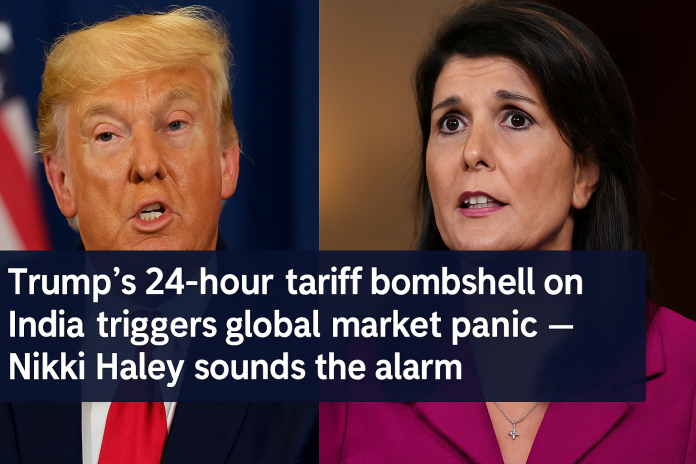In a sudden move that has sent shockwaves across international trade circles, U.S. President Donald Trump announced that his administration may impose heavy new tariffs on Indian exports. The proposed tariffs, he said, could rise “very substantially” within the next 24 hours, crossing the previously agreed 25% mark.
Trump’s threat rattles global trade ties
This development comes as part of a broader effort by the U.S. to penalize countries maintaining strong trade ties with Russia, especially over oil imports. Trump directly linked the tariff escalation to India’s continued purchase of Russian oil, stating that such actions help “fuel the war machine.” He argued that while the U.S. has worked to reduce dependencies on nations seen as geopolitical rivals, partners like India have not made similar efforts.
India, however, has maintained that its energy policy is guided by national interest. Officials from India’s external affairs ministry have repeatedly pointed out that many Western countries, including the U.S. and the European Union, continue to trade with Russia despite sanctions and criticism. India has long defended its oil purchases from Russia as a way to ensure affordable energy access for its population.
Trump’s comments were made during a high-profile interview on CNBC, where he outlined the rationale for raising tariffs not only on pharmaceuticals but also on goods from nations seen as favoring trade with America’s adversaries. “We agreed on 25%, but I’m going to raise that very substantially now because of their Russian oil trade,” he said, referring to India.
While Trump acknowledged that India had recently offered zero tariffs on select U.S. products as part of a new trade proposal, he brushed off the gesture as inadequate. “Zero tariffs aren’t enough when they’re helping fund a war we oppose,” he added during the same interview.
Criticism erupts from allies and trade experts
The announcement sparked immediate backlash, including from Trump’s own political allies. Nikki Haley said India should not be buying oil from Russia. But China, an adversary and the number one buyer of Russian and Iranian oil, got a 90-day tariff pause. Don’t give China a pass and burn a relationship with a strong ally like India.
India should not be buying oil from Russia. But China, an adversary and the number one buyer of Russian and Iranian oil, got a 90-day tariff pause. Don’t give China a pass and burn a relationship with a strong ally like India.
— Nikki Haley (@NikkiHaley) August 5, 2025
A prominent Republican figure criticized the move on social media, saying the plan to punish India while giving China a 90-day tariff pause on oil-related imports sends the wrong signal. The comment highlighted a perceived inconsistency in Trump’s trade policy — rewarding adversaries while risking relationships with key strategic allies like India.
The situation also triggered concern among economists, trade analysts, and business groups on both sides. Several experts noted that a sudden spike in U.S. tariffs could create uncertainty for companies operating across borders, particularly in sectors that depend heavily on the U.S. market.
Indian businesses, especially in the textile, gems and jewellery, chemicals, and auto parts sectors, are likely to bear the brunt of this proposed policy shift. These industries rely significantly on exports to the United States and may see a drop in competitiveness if higher tariffs are applied.
Meanwhile, India’s trade surplus with the U.S. — which had climbed to $41 billion in the fiscal year 2024–25 — could shrink. According to data from rating agency ICRA, new tariffs and the political tensions driving them are already having an impact. ICRA has revised India’s GDP growth forecast for the financial year 2025–26, lowering it from 6.2% to 6.0%.
ICRA warned that the proposed policy changes in Washington could hurt investor sentiment and discourage further trade engagement. “Policy unpredictability and sudden tariff changes make planning difficult for Indian exporters,” the agency noted in its report. The review also mentioned that uncertainty in international demand may delay capital investments and supply chain expansions.
What stays stable and what’s at risk
Despite the gloomy projections, not all sectors are expected to be equally affected. According to trade analysts, Indian pharmaceutical exports — which currently make up over 37% of India’s total pharma shipments — have so far remained untouched by U.S. tariff hikes. This category is considered essential for American healthcare and may continue to enjoy certain protections, at least in the near term.
Similarly, exports of petroleum products and telecom equipment may remain relatively stable, given their strategic importance. However, any further escalation in political rhetoric or unexpected executive orders could change that scenario quickly.
The underlying concern among many observers is the message being sent to international partners. By publicly linking tariffs to geopolitical behavior, the U.S. risks being seen as weaponizing trade relationships. This creates nervousness in countries that may not agree with U.S. foreign policy but still value their economic ties with America.
For now, business leaders in India are closely monitoring the developments and hoping for a de-escalation. Several trade bodies have appealed for dialogue, suggesting that mutual economic interest should not be sacrificed at the altar of geopolitics.
As the clock ticks toward Trump’s 24-hour timeline, the Indian export industry, international markets, and diplomatic observers wait anxiously. The world watches as trade tensions threaten to unravel years of steady progress between two of the largest democracies on the planet.


